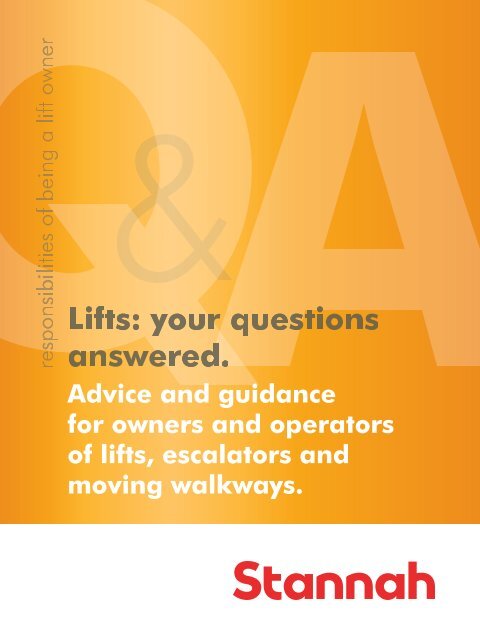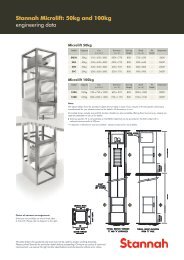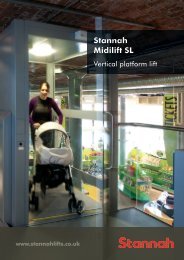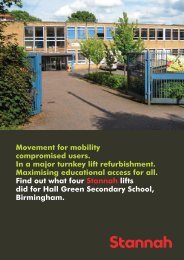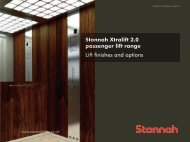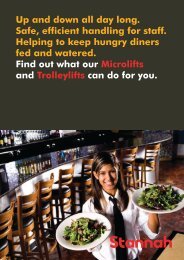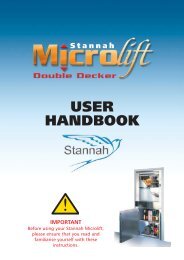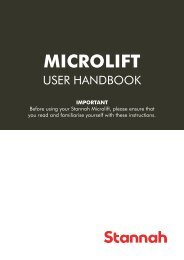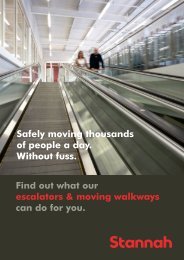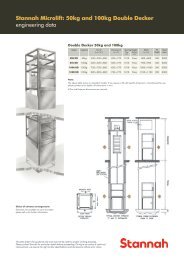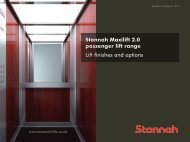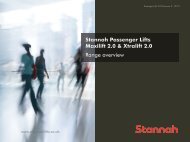Lifts, your questions answered2.42MBAdvice and ... - Stannah
Lifts, your questions answered2.42MBAdvice and ... - Stannah
Lifts, your questions answered2.42MBAdvice and ... - Stannah
Create successful ePaper yourself
Turn your PDF publications into a flip-book with our unique Google optimized e-Paper software.
Advice <strong>and</strong> guidancefor owners <strong>and</strong> operatorsof lifts, escalators <strong>and</strong>moving walkways.
Contents5 Introduction7-11 Lift safety – <strong>your</strong>responsibilities13-15 Maintenance: servicing,breakdown <strong>and</strong> repair17-19 Refurbishment <strong>and</strong>modernisation20 Additional lifts:st<strong>and</strong>ard <strong>and</strong> bespoke23-30 Lift Statutes <strong>and</strong>Guidelines31-33 Guidelines on theSupplementary Testingof In-service <strong>Lifts</strong>35-40 Escalators <strong>and</strong> movingwalkways – <strong>your</strong>responsibilities41-44 Escalator <strong>and</strong> movingwalkway Statutes<strong>and</strong> Guidelines45-47 How can <strong>Stannah</strong> LiftServices help you?48-49 <strong>Stannah</strong> Service Branches51 A family of lift expertise52-53 Products in the <strong>Stannah</strong>Range2
Dear CustomerAs a national lift service provider we areconstantly asked for our advice.This updated version of our informationbooklet aims to provide answers to themost frequently asked <strong>questions</strong> to assistyou in <strong>your</strong> responsibilities <strong>and</strong> concernsabout lift products.Safety is top of the list, followed closely bymeeting Regulations <strong>and</strong> St<strong>and</strong>ards.A more recent set of <strong>questions</strong> concerns themodernisation or replacement of existingequipment, particularly focusing on waysof improving energy efficiency.A new area is the addition of <strong>questions</strong>about escalators <strong>and</strong> moving walkways.These products are also in our portfolio sowe can answer our customers’ concerns onsafe operation <strong>and</strong> running costs.Owning or managing lifts need not beonerous as long as you remain wellinformedby <strong>your</strong> lift service provider.We hope this booklet will prove useful.If you have further <strong>questions</strong> please donot hesitate to contact us.Yours sincerelyJon <strong>Stannah</strong>43
Introduction<strong>Lifts</strong>, as with allmachinery, requireregular servicing.Preventativemaintenance willhelp to keep <strong>your</strong>lift in optimumcondition, leading tofewer breakdowns,a more reliable lift<strong>and</strong>, in the mediumto long term, lowerrunning costs.Owners have a responsibility to keep up to datewith any changes in legislation, st<strong>and</strong>ards <strong>and</strong>codes of practice that might affect their lifts.It is recognised that the care of this type ofequipment is highly specialised but help will beprovided from a reputable maintenancecontractor. Your service provider should adviseabout possible breaches of legislation orcompromise of safety for passengers.If you own or occupy premises in which there is a lift,you <strong>and</strong>/or <strong>your</strong> company are responsible, underThe Health <strong>and</strong> Safety at Work Act 1974, formaintaining <strong>your</strong> lift in good <strong>and</strong> safe workingorder. If <strong>your</strong> lift is in a workplace you also have anobligation to have the lift thoroughly examinedregularly by a competent person, who will inspectthe lift with a view to safety, <strong>and</strong> should advise youof any defects.Founded by Joseph <strong>Stannah</strong> in the 1860s, <strong>and</strong>currently looking after over 81,000 lift productsnationwide, <strong>Stannah</strong> Lift Services has plenty ofexperience to assist you with the maintenance of<strong>your</strong> lifts. In addition to lift maintenance, we canadvise you on matters such as health <strong>and</strong> safety.<strong>Stannah</strong> Lift Services is certified with ISO 9001(management systems), ISO 18001 (health <strong>and</strong>safety systems) <strong>and</strong> ISO 14001 (environmentalmanagement).We are proud of our certifications – theydemonstrate our commitment to delivering anoutst<strong>and</strong>ing service to our customers.5
Lift safety:<strong>your</strong>responsibilities7
Lift safety – <strong>your</strong>responsibilitiesI have a lift in mybuilding. What do Ineed to do?You should arrange for the lift to be maintained(regularly serviced <strong>and</strong> kept in good repair) <strong>and</strong>, if thelift is in a place of work, thoroughly examined atintervals in line with legislation.Am I legally obligedto have my liftmaintained?Yes. The general duties imposed by The Health <strong>and</strong>Safety at Work Act 1974 mean that you are obliged tokeep <strong>your</strong> lift in safe working order. This means youmust arrange for regular maintenance of <strong>your</strong> lift.Am I legally obligedto have my liftThoroughlyExamined?Yes. Regulation 9 of the Lifting Operations <strong>and</strong> LiftingEquipment Regulations 1998 (LOLER) requires thata lift undergoes an inspection/thorough examinationby a competent person at regular intervals (twicea year for passenger lifts, once for goods lifts oraccording to the lifts’ situation) <strong>and</strong> applies to alllifts <strong>and</strong> lifting equipment used at work.What is thedifference between‘Maintenance’<strong>and</strong> ‘ThoroughExamination’?Maintenance is the regular servicing of the lift,encompassing the routine adjustment to components,replacement of worn or damaged parts, topping up offluids <strong>and</strong> so on, <strong>and</strong> should be carried out by anexperienced <strong>and</strong> competent lift company, such as<strong>Stannah</strong> Lift Services. Maintenance is carried out toensure the lift runs efficiently <strong>and</strong> safely.Thorough Examination is the systematic <strong>and</strong> detailedvisual inspection of the lift <strong>and</strong> all its associatedequipment <strong>and</strong> would usually be carried out by <strong>your</strong>insurance company, or an appointed ‘competentperson’. Thorough Examination provides a goodcheck that maintenance is being carried out properly.It focuses entirely on the safety of the equipment.9
Thorough Examination, as referred to in TheGuidelines for Supplementary Testing of In-service<strong>Lifts</strong> (explained in a detailed section on pages 31-32),may also be referred to as Form 54 Inspection – thecode given to the original form on which the findingsof a thorough examination were recorded. Althoughno longer prescribed for use, the term remains.It might also be referred to as a periodic inspection,F54 inspection, statutory inspection (because it isrequired by law) or insurance inspection (because itwas usually carried out by insurers).Do I have aresponsibility fortrapped passengers?Yes, you have a responsibility to have an emergencyplan in place, in line with BS EN81-28.My ‘competentperson’ <strong>and</strong>/orservice provider havementioned LG1s.What are they?LG1 was the old terminology for The SupplementaryTests <strong>and</strong> may still be referred to as such by manypeople in the lift industry.Once I have arrangedmaintenance <strong>and</strong>ThoroughExamination can Iforget about the lift?No. The ultimate responsibility for the equipment in<strong>your</strong> building stays with you. For this reason anyreports, documents or certificates of examinationprovided in connection with the lift should be read(some may require action on <strong>your</strong> part) <strong>and</strong> retained.Additionally, when visiting <strong>your</strong> building to carry out aservice visit, or attend a breakdown, lift engineersneed to be able to get to <strong>and</strong> from their working areasafely <strong>and</strong>, once there, be able to work safely.During the life ofmy lift, will it benecessary tomodernise theequipment?BS EN 81-80 is the latest lift st<strong>and</strong>ard which identifieshow to ensure <strong>your</strong> lift remains safe. Upgrading partsof <strong>your</strong> lift may be necessary when new technologywill improve its safety (see p 28). Your service providerhas a duty to advise you of any such improvementsavailable.10
How can<strong>Stannah</strong>help me?<strong>Stannah</strong> Lift Services can help youto meet <strong>your</strong> obligations as a liftowner/operator by providing regularmaintenance of all types of lifts fromall manufacturers.Our 328 highly trained lift engineersare based in 11 service branches,nationwide – together they look aftermore than 81,000 lifts <strong>and</strong> liftproducts across the UK.We provide a range of servicecontracts to suit individual customerneeds <strong>and</strong>, in addition, can providepersonnel to carry out all tests <strong>and</strong>examinations.All our engineers record their workon a mobile communications systemthat links to their base branch.This means they log all reports <strong>and</strong>requests for parts after each servicevisit, so that follow-up action can becarried out quickly <strong>and</strong> efficiently.114
124
Maintenance: servicing,breakdown <strong>and</strong> repairShould I have my liftserviced?Yes, as stated on page 4, you are obliged by TheHealth <strong>and</strong> Safety at Work Act 1974 to keep <strong>your</strong> liftin safe working order. In addition, if <strong>your</strong> lift is in aplace of work then PUWER (Provision <strong>and</strong> Use of WorkEquipment Regulations 1998) applies too. Regularservicing will assist you to achieve this.How often should Ihave my lift serviced?The frequency of service visits depends on the type oflift you have, the number of floors served <strong>and</strong> the level<strong>and</strong> type of use it is subjected to. When deciding uponmaintenance frequency, you should remember thatservicing is about preventative maintenance, i.e. moreservice visits should result in a more reliable lift <strong>and</strong>lower running costs in the medium to long term. Yourlift company should advise you on the appropriatevisit profile, based on risk assessment.What does a servicevisit involve?During a service visit, an engineer will check the safetyfeatures on the lift, as well as cleaning, lubricating<strong>and</strong> adjusting all components for optimumperformance. A <strong>Stannah</strong> engineer would thencomplete a service screen on his laptop stating thework carried out <strong>and</strong> detailing any comments suchas suggested repairs or works of improvement notcovered by the contract. A report should be issuedafter each engineer visit.Will my lift be out ofaction while aninspection or serviceis taking place?Yes. The engineer will need to check many itemswithin the shaft <strong>and</strong> motor room <strong>and</strong> so the lift will be‘out of service’ while the engineer is on site.13
What happens if mylift breaks down?You have a responsibility to make arrangements todeal with emergency breakdowns in the event that anunsafe condition may be caused. <strong>Stannah</strong> provides a24-hour service, 365 days a year, right across the UK.See page 48 for details of <strong>your</strong> nearest ServiceBranch.What happens if mylift needs repairing?In addition to the breakdown emergency service, <strong>your</strong>lift service provider should have the capability toprovide a repair service.Will I be charged forbreakdowns/repairs?This depends on the type of contract you have with<strong>your</strong> service provider <strong>and</strong> the nature of the fault.Matters outside a lift company’s control, such asmisuse or v<strong>and</strong>alism, would normally not be coveredby any contract.What happens ifsomeone is trappedwithin the lift when itbreaks down?The person within the lift car should be able to seekthe attention of someone else using the emergencyalarm within the lift car, in order that the emergencycall-out service can be contacted. Any reputable liftcompany should treat trapped passengers as apriority. Many lifts now have a telephone facility withinthe lift car (all passenger lifts installed since July 1999must have a suitable communications device fitted) inorder that contact can be made with the outside worldshould the lift fail with someone trapped inside.As part of <strong>your</strong> workplace risk assessment you shouldconsider the need for Passenger Release Training.Your service provider should be able to help youwith this.Note: As a general rule, a person alone in a buildingshould not use a lift.14
How can<strong>Stannah</strong>help me?Service ContractsAt <strong>Stannah</strong> Lift Services we offer acomplete maintenance, call-out <strong>and</strong>repair service, based around a rangeof maintenance contracts designed tosuit <strong>your</strong> every need <strong>and</strong> budget.24-hour emergency breakdownserviceOur 24-hour emergency breakdownservice offers peace of mind with theknowledge that <strong>Stannah</strong> is availableevery hour of the day <strong>and</strong> night to put<strong>your</strong> lift back into service.Preventative maintenanceAll our contracts include regularservice visits during which ourengineers will inspect, clean, lubricate<strong>and</strong> adjust all components foroptimum performance. When on sitewe complete a report detailing thework carried out, in addition toidentifying any weak or faultycomponents.RepairsOur repair service will assist you inkeeping <strong>your</strong> lift in excellent condition,improving its reliability <strong>and</strong> life-cyclecosts.154
4 16
Refurbishment <strong>and</strong>modernisationMy lift is quite old.What can I do tobring it up to date?An old lift does not necessarily need replacing in itsentirety <strong>and</strong>, in fact, doing so may be extremelydifficult due to the design or layout of the existinginstallation. Instead, you can have a lift modernised;obsolete components are replaced by their modernequivalent <strong>and</strong> new features are added that were notavailable when the lift was originally installed. Thiscould result in a ‘new’ safer lift that complies with newlegislation, offers improved reliability, enhances trafficflow within the building <strong>and</strong> has superior finishes.Why modernisemy lift?There are a number of reasons to modernise <strong>your</strong> lift:Improving performance <strong>and</strong> traffic flowA modernisation might involve replacing the driveunit, gearbox <strong>and</strong> control system of <strong>your</strong> lift. This willresult in a faster lift with a smoother ride, <strong>and</strong> couldincorporate an ‘intelligent’ control system offeringimproved traffic flow within the building.Improved reliability <strong>and</strong> lower maintenance costsOld, unreliable components might cause a lift tobreak down regularly, resulting in costs from bothperiods of downtime <strong>and</strong> repairing the lift.Replacement of these components, along with regularmaintenance, will reduce lift downtime, offeringimproved reliability <strong>and</strong> lower running costs.Adding value to the buildingWhile the aforementioned would obviously add valueto the lift, <strong>and</strong> thus the building in which it is situated,aesthetic improvements can also offer similarbenefits. These might involve ‘re-skinning’ l<strong>and</strong>ingdoors, replacing lighting, or fitting mirrors, withinthe car.17
Over recent years, new legislation regarding disabledaccess, health <strong>and</strong> safety etc. has been introducedwhich affects those responsible for lifts (see pages25-28).A modernisation might allow you to comply withthe new legislation without the need to replacethe lift.There are many features that can be added to a liftin order to meet the needs of disabled users, in linewith BS EN 81-70. Human voice enunciators tellpassengers the direction of travel <strong>and</strong> theapproaching floor level. The travel direction <strong>and</strong>current position of the lift car is shown by in-car <strong>and</strong>l<strong>and</strong>ing digital position indicators. Other featuresinclude large, tactile <strong>and</strong>/or Braille push buttons <strong>and</strong>infra-red door detectors.Health <strong>and</strong> safety is becoming ever more important.<strong>Lifts</strong>, particularly older ones, can be dangerouswithout appropriate maintenance.Modern technology allows us to incorporate moresophisticated safety devices, offering benefits to users<strong>and</strong> service engineers alike.Energy savingReplacing old drive systems with modern ones canhelp reduce power consumption by up to 30% ormore.Do I need tomodernise my lift,to fully meet theEquality Act 2010requirements?No, you need only make reasonable adjustments to<strong>your</strong> existing lift where practical to do so.18
My lift car dimensionsare less than theminimum required inBS EN 81-70 (1100mmwide x 1400mm deep)– what adjustmentcan I make?In this situation it would be both unreasonable <strong>and</strong>impractical to make any size adjustments, mainly dueto the restrictions of the existing lift shaft dimensions.What adjustments canI be expected to maketo the lift car?Fit a h<strong>and</strong>rail; install a mirror to help wheelchairusers negotiate entry <strong>and</strong> exit when turning space islimited; install a floor position indicator; install avoice enunciator; install an emergencycommunication system; relocate a car push buttonpanel <strong>and</strong> ensure it has tactile buttons that illuminate<strong>and</strong> are audible when pushed <strong>and</strong> install full heightdoor safety edge protectors.What adjustments canI be expected to maketo the l<strong>and</strong>ings?Fit location signs on the approach to a lift; ensure thelift doors are visually distinguishable from adjoiningwalls; ensure the l<strong>and</strong>ing push buttons are suitablypositioned for wheelchair users to reach, <strong>and</strong> providea visual <strong>and</strong> audible indication of lift arrival at the liftlobby.I am still confusedabout what isexpected of me asa lift ownerResponsible lift management is confusing, but<strong>Stannah</strong> is on h<strong>and</strong> to help. Please contact <strong>your</strong>local <strong>Stannah</strong> Service Branch for more information<strong>and</strong> advice (contact details are on page 48).19
Additional lifts:st<strong>and</strong>ard <strong>and</strong> bespokeIf I need additionallifts on my site is itpossible to matchthem to my existingunits?Yes. Lift suppliers should be able to help you blendnew lifts into <strong>your</strong> building by way of creatingbespoke solutions.In what way can a liftbe bespoke? Is it thelift car finish only?Bespoke solutions really mean ‘unique’ to thecustomer. So <strong>your</strong> lift may need to have a special liftcar finish to be resilient in a dem<strong>and</strong>ing environment,including making it as v<strong>and</strong>al-resistant as possible.It may need to be aesthetically matched to itsenvironment, for instance, within a listed building.The drive system may be bespoke as can the shaftitself <strong>and</strong> all the controls. Most things are possible.Is it possible to installa lift without havingto build a lift shaftagainst an existingexterior wall?It certainly is. Many lifts are supplied structuresupported.This means they come in a pre-built shaftthat gains its support from the base <strong>and</strong> each floor itpasses through. At <strong>Stannah</strong> we supply passenger lifts,platform lifts <strong>and</strong> goods lifts in this way.20
How can<strong>Stannah</strong>help me?The Major Projects Team at <strong>Stannah</strong>Lift Services is a team of experts inevery aspect of major contracts. Theirscope includes health <strong>and</strong> safety,construction, design <strong>and</strong> manufacture,technical training <strong>and</strong> installations<strong>and</strong> maintenance. Together theycreate <strong>and</strong> manage bespoke solutionsfor our clients.Each of our service branchesnationwide can provide local adviceabout new installations <strong>and</strong>refurbishment of existing lifts.We regularly provide bespokesolutions for historic, unique <strong>and</strong>dem<strong>and</strong>ing environments.214
224
Lift Statutes<strong>and</strong>Guidelines234
4 24
Lift Statutes <strong>and</strong>GuidelinesThere is a whole host of st<strong>and</strong>ards, regulations,codes of practice <strong>and</strong> guidance covering the safe<strong>and</strong> efficient operation of lifts. Your lift serviceprovider should be able to give you the best adviceto ensure you are meeting <strong>your</strong> obligations.We have listed the principal guidance for <strong>your</strong>reference below:RegulationsSt<strong>and</strong>ardsthat supportthe RegulationsHealth <strong>and</strong> Safety at Work Act 1974 (HSWA 74)Provision <strong>and</strong> Use of Work Equipment Regulation 1998(PUWER)Lifting Operations <strong>and</strong> Lifting Equipment Regulations 1998(LOLER)Workplace (Health, Safety <strong>and</strong> Welfare) Regulations 1992Management of Health <strong>and</strong> Safety at Work Regulations 1999The Lift Regulations 1997Regulations for the construction of lifts where they areintended to be used for the transport of persons.The Supply of Machinery (Safety) Regulations 2008 (TheMachinery Directive)Safety rules for the construction <strong>and</strong> installation of liftsincluding;BS EN 81-1:1998 Incorporating Amendments 1 to 3 <strong>and</strong>Corrigendum 1 (Electric lifts)BS EN 81-2:1998 Incorporating Amendments 1 to 3 <strong>and</strong>Corrigendum 1 (Hydraulic <strong>Lifts</strong>)BS EN 81-20:2014 (New st<strong>and</strong>ard to replace 81-1 <strong>and</strong>81-2 over a three-year period).BS EN 81-50:2014 (New rules governing the design oflifts)25
BS EN 81-3:2000 + A1:2008 (Electric <strong>and</strong> hydraulicservice lifts)BS EN 81-28:2003 (remote alarm on passenger <strong>and</strong>goods passenger lifts)BS 5900:2012 (powered homelift in domestic singleoccupancydwellings)BS 6440:2011 (powered lift platform with non-enclosedliftway, for persons with impaired mobility)BS EN 81-31:2010 (accessible goods lifts)BS EN 81-40:2008 incorporating corrigendum 2009(Stairlifts <strong>and</strong> inclined lifting platforms intended for personswith impaired mobility)BS EN 81-41:2010 (vertical lifting platforms with enclosedliftway, for persons with impaired mobility)BS EN 81-70:2003 incorporating corrigenda 1&2(Accessibility to lifts for persons including persons withdisability)BS EN 81-71:2005 incorporating amendment 1 (v<strong>and</strong>alresistant lifts)BS EN 81-72:2005 (fire fighters lift)BS EN 81-73:2005 (behaviour of lifts in the event of a fire)BS EN 81-80:2003 (rules for the improvement of safety ofexisting passenger <strong>and</strong> goods passenger lifts)BS EN 13015:2001 incorporating amendment 1 2008(maintenance for lifts <strong>and</strong> escalators – Rules formaintenance instructions)BS 5655:2005 Part 11 (code of practice for theundertaking of modifications of electric lifts)BS 5655:2005 Part 12 (code of practice for theundertaking of modifications of hydraulic lifts)BS 5655:2002 Part 6:2011 (code of practice for theselection <strong>and</strong> installation of new lifts)BS 9102:2014 (code of practice for safe working onlifting platforms)BS 7255:2012 incorporating amendment 1 (code ofpractice for safe working on lifts)BS 7801:2011 (code of practice for safe working onescalators <strong>and</strong> moving walks)26
BS 5266-10:2011 (guide to the design <strong>and</strong> provision ofemergency lighting)BS EN 81-21: (New lifts <strong>and</strong> complete lift modernisationsin existing buildings)Disabilitydiscrimination,equality <strong>and</strong>related guidanceThe Equality Act 2010 requires buildings to beaccessible to people with disabilities, so as to limitdiscrimination against them when gaining access tobuildings <strong>and</strong> services.From January 2004 service providers should havemade reasonable adjustments to the physical featuresof their premises to provide access for people withdisabilities, by means of ramps, platforms orsuitable lifts.To help providers conform to the requirementsof the Equality Act 2010, the following are in placeto offer guidance:Part M <strong>and</strong> S Building RegulationsThese are Building Regulations that give guidance onproviding ‘access for all’, including people withdisabilities, when considering vertical circulationwithin a building. These regulations refer to manyothers including:BS 8300Code of Practice replacing BS 5810 offering guidancefor all building design as well as general guidance forlifts <strong>and</strong> escalators, providing more in depth detail inaddition to Part M or S.BS 8300 recommends that in multi-storey buildings atleast one lift is of sufficient size to be accessible* bywheelchair users <strong>and</strong> people with mobility difficulties.BS 9999:2008Code of Practice for fire safety in the design,management <strong>and</strong> use of building evacuation.EN 81-82:2013Rules for upgrading existing lifts for persons withdisability.27
BS EN 81-70Part 70 of European St<strong>and</strong>ard EN 81, with regards toAccessibility to <strong>Lifts</strong> for Persons, including Persons withDisabilities.This St<strong>and</strong>ard defines the minimum requirements forsafe, independent access <strong>and</strong> use of lifts by persons,including those with disabilities. For all passenger liftsserving two or more levels it defines accessibility onthe approach to the lift, within the lift car <strong>and</strong> exitingthe lift, taking into account people with pushchairs,wheelchairs, walking aids, mental disability, sight <strong>and</strong>hearing impairment.BS EN 81-70 is now the accepted benchmark for thecompliance of NEW lifts to meet current requirementsof the Equality Act 2010 <strong>and</strong> the Lift Regulations 1997.BS EN 81-80Part 80 of European St<strong>and</strong>ard EN 81 relates to theupgrading of EXISTING lifts, to ensure they are safe touse by all members of the public.This is a safety st<strong>and</strong>ard that provides a guide to riskassessment of a lift <strong>and</strong> subsequent recommendationsfor how to achieve improved safety. The aim is tomatch the level of safety achieved by a newlyinstalled lift.* An Accessible Lift (as defined by BS 8300 <strong>and</strong>BS EN 81-70) is:• One you can find easily• Large enough for its intended use• One with space outside to manoeuvre• Fitted with lift controls that are easily found <strong>and</strong>identifiable• Fitted with visual <strong>and</strong> audible signals• One with a clear entrance of suitable width• Fitted with a reasonable level of lighting in the car<strong>and</strong> on all l<strong>and</strong>ings• Accurate on stopping to ensure ease of entry/exit28
Questionsto considerDo I need to modernise my lift to fullymeet BS EN 81-80 requirements?Yes, you need to make reasonableadjustments to <strong>your</strong> existing lift i.e.where practicable to do so, to meetst<strong>and</strong>ards in BS EN 81-80.What are some of the adjustments thatI can be expected to make to the lift?Adjustments, to improve safety forpassengers <strong>and</strong> engineers, brieflymay include:• Improving floor levelling at eachl<strong>and</strong>ing• Installing a 24-hour 2-waycommunication device• Ensuring space is available towork at the top <strong>and</strong> bottom of<strong>your</strong> lift shaft• Installing permanent effectivelighting, sufficient to illuminatethe work area for engineers• Ensuring a safe means of accessis available to the machine/pulleyroom• Installing an apron to the lift car sill• Installing a modern electronicdevice to remove risk to passengersof being struck by closing doors• Installing a balustrade on thecar roof• Making sure the main electricswitch can be locked-off294
304
Guidelines on theSupplementary Testing ofIn-service <strong>Lifts</strong> (formerly LG1)Part of <strong>your</strong> responsibility as a lift owner/operator is toensure you are complying with these Guidelines, asset out by SAFed (The Safety Assessment Federation)<strong>and</strong> endorsed by the Health <strong>and</strong> Safety Executive.The Guidelines have replaced LG1s. ThoroughExaminations can be made at appropriate intervals,taking into account the type of equipment. Thoughaimed at workplace lifts, they can also be used fornon-workplace lifts such as flats <strong>and</strong> shelteredhousing. Your lift service provider should advise youof <strong>your</strong> obligations.Who are theseGuidelines for?They are Guidelines for the ‘competent person’ tohelp them decide what Supplementary Tests may berequired.Who is the‘competent person’?The ‘competent person’ is the person you haveappointed to carry out the Thorough Examination inaccordance with LOLER (The Lifting Operations <strong>and</strong>Lifting Equipment Regulations 1998).Who can carry outa ThoroughExamination for thepurposes of LOLER?The Health <strong>and</strong> Safety Executive advises:“a competent person is someone who has sufficienttechnical <strong>and</strong> practical knowledge of the lift to be ableto detect any defects <strong>and</strong> assess how significant theyare. It is also important that the ‘competent person’ issufficiently independent <strong>and</strong> impartial to allowobjective decisions to be made. For this reason, it isnot advisable for the same person who performsroutine maintenance to carry out thoroughexamination, as they are responsible for assessingtheir own work”.Ref: IND(g)339(rev1), www.hse.gov.uk/pubns/indg339.pdf31
What would the‘competent person’ doduring the ThoroughExamination?The ‘competent person’ would examine the lift forsafety <strong>and</strong> also specify further Supplementary Testsidentified as being necessary.If specified by the‘competent person’,are theSupplementary Testsa legal requirement?Who can carry out theSupplementary Tests?Are theSupplementary Testsdone during theThoroughExamination?Yes. Supplementary Tests provide ‘best practice’ forlift maintenance. Your service provider may alsoidentify Supplementary Tests to meet <strong>your</strong> obligationsunder Health <strong>and</strong> Safety law <strong>and</strong> you should pass onany such information to <strong>your</strong> ‘competent person’.Should an incident occur, the lift owner or premisesmanager may be prosecuted <strong>and</strong> may be judgedagainst ‘best practice’.<strong>Stannah</strong> has skilled engineers to complete theSupplementary Tests required by the ‘competentperson’ carrying out a Thorough Examination. Ourexperience enables us to detect, report on <strong>and</strong> correctany deficiencies in an efficient manner.Some simple tests are done by the ‘competent person’during Examinations. However, more complex ordynamic tests will usually be conducted by <strong>your</strong>service provider.What if my liftfails any of theSupplementary Tests?So where do I gofrom here?If the failure is likely to cause an imminent danger<strong>your</strong> service provider should contact you immediatelyto discuss the best way of correcting the lift. Usually itwill be corrected at the time <strong>and</strong> re-tested.Contact <strong>Stannah</strong>; we will advise you on the best <strong>and</strong>most efficient means of completing SupplementaryTests <strong>and</strong> complying with <strong>your</strong> legal requirementsregardless of type of lift or environment.32
How can<strong>Stannah</strong>help me?Supplementary Testing ofIn-service <strong>Lifts</strong><strong>Stannah</strong> can carry out all these tests<strong>and</strong> issue certificates, no matter whatmake of lift you own. Our engineerswill carry out the tests in accordancewith industry guidelines, in addition toadhering to safe working methods atall times.Thorough Examinations<strong>Stannah</strong> has fully trained <strong>and</strong>competent engineers who can be <strong>your</strong>appointed ‘competent person’ to carryout Thorough Examinations of all <strong>your</strong>lifting equipment <strong>and</strong> makerecommendations for repair.A separate <strong>Stannah</strong> maintenanceengineer would then carry outthe work.Advice on planning maintenance <strong>and</strong>inspection regimesAt <strong>Stannah</strong> we are proud of ourconsultative services: we advise ourcustomers of their responsibilities <strong>and</strong>then, as partners, help them to planthe sensible, safe <strong>and</strong> effectivemanagement of their lifts.Contact <strong>your</strong> local <strong>Stannah</strong> branch –details on page 48.334
Escalators<strong>and</strong> movingwalkways354
4 364
Escalators <strong>and</strong>moving walkways -<strong>your</strong> responsibilitiesOwners have a responsibility under TheManagement of Health <strong>and</strong> Safety at WorkRegulations 1999 to keep up to date with anychanges in legislation, st<strong>and</strong>ards <strong>and</strong> codes ofpractice that might affect their escalator/movingwalkway equipment. It is recognised that the careof this type of equipment is highly specialised buthelp will be provided from a reputablemaintenance contractor. Your service providershould advise about possible breaches oflegislation or compromise of safety for passengers.I have a newescalator installation.When do I need tohave it inspected?All new escalators <strong>and</strong> moving walkways must complywith the Machinery Directive <strong>and</strong> therefore meet withall current industry st<strong>and</strong>ards. The contractor whosupplied <strong>your</strong> equipment will normally provide a12-month warranty covering parts <strong>and</strong> labour <strong>and</strong>,in many cases, may include maintenance work to‘fine tune’ the equipment as it settles into the building.What should I dowhen taking overresponsibility for anexisting walkway orescalator?It is essential to get an initial inspection of theequipment carried out by a specialist building servicesconsultant or a lift/escalator contractor. They can thenrecommend any work that may be needed to bring itin line with current requirements.37
Are there anyparticular issues witholder escalators ormoving walkways?If <strong>your</strong> equipment is more than ten years old it isunlikely to comply with all the current legislation,including the safe working requirements forengineers. Escalators require balustrade skirtingdeflector devices, adequate stop buttons <strong>and</strong>appropriate safety notices.What might bethe scope ofrefurbishment work ifI decided to upgrademy equipment?Your equipment would firstly have to meet all currentlegislation, including complying with BS EN 115,fulfilling all safety requirements of the EC Directive<strong>and</strong> carrying the CE Mark. Ideally <strong>your</strong> suppliershould be able to demonstrate compliance withISO 9001:2000.What is the life-cycleof an escalator/moving walkway?<strong>Lifts</strong>, escalators <strong>and</strong> moving walkways tend to have amuch longer life span than most other forms oftransportation. A building that is 60 years old willtypically have had three or four upgrades or totalreplacements of lifting equipment in that period. Theactual life span is dependent on traffic <strong>and</strong> usage.Assuming myequipment meets allcurrent st<strong>and</strong>ards,how often would I haveto have service visits?This is dependent on the amount of day-to-day traffic.Your maintenance company can advise you of asuitable schedule, based on risk assessment requiredby Management Regulations 1999.Is there specialequipment I coulduse to upgrade myescalator/movingwalkway in order toimprove its energyefficiency?Increasingly sophisticated motor energy controllerscan be fitted that continuously monitor motor loadingconditions <strong>and</strong> regulate the power feed into themotor. Motor energy control can achieve up to 30%energy saving during light or no load condition.38
How can<strong>Stannah</strong>help me?New products<strong>Stannah</strong> supply <strong>and</strong> install new escalators<strong>and</strong> moving walkways for many wellknowncompanies in the UK. For moreinformation about our product ranges goto www.stannahlifts.co.uk/escalatorsRefurbishment <strong>and</strong> Modernisations<strong>Stannah</strong> can help you to extend the life ofexisting equipment by upgrading variouselements in line with BS EN 1152:2002.This can not only result in improvedoperation but can actually save onrunning costs too.Service contractsAt <strong>Stannah</strong> Lift Services we offer acomprehensive maintenance <strong>and</strong> repairservice for escalators <strong>and</strong> movingwalkways. Please call <strong>your</strong> local branchfor details (see page 48).24-hour emergency serviceOur 24-hour emergency breakdownservice offers peace of mind. We willendeavour to return <strong>your</strong> unit back intoservice, with minimum disruption to <strong>your</strong>operations.Preventative maintenanceAll our contracts include planned regularservice visits during which our engineerswill inspect, clean, lubricate <strong>and</strong> adjust allcomponents for optimum performance.RepairsOur repair service will assist you inkeeping <strong>your</strong> units in excellent workingorder, improving their reliability <strong>and</strong> lifecycle costs.394
31 404
Escalators <strong>and</strong>moving walkways:Statutes <strong>and</strong> GuidelinesEscalators <strong>and</strong> moving walkways are used bymillions of people every day. Their safety is crucial<strong>and</strong> Regulations, St<strong>and</strong>ards <strong>and</strong> Guidelines exist toensure they continue to be safe modes of transport<strong>and</strong> also to ensure the safety of engineersmaintaining the equipment.The Machinery DirectiveThe ‘new’ The Supply of Machinery (Safety)Regulations 2008 covers all machines (from lawnmowers to escalators). The updated Directive providesthe harmonisation of the essential health <strong>and</strong> safetyrequirements for machinery, through a combinationof m<strong>and</strong>atory health <strong>and</strong> safety requirements <strong>and</strong>voluntary harmonised st<strong>and</strong>ards. The Directive appliesto new products put into the market for the first time.BS EN 1152:2010Rules for the improvement of safety for existingescalators <strong>and</strong> moving walkways.BS 8300:2009 + A1:2010This Code of Practice offers guidance for all buildingdesign, including general guidance for lifts, escalators<strong>and</strong> moving walkways. It incorporates amendments tomeet the needs of disabled people.41
BS EN 115-1:2008This European St<strong>and</strong>ard lays out the safety rules forthe construction <strong>and</strong> installation of escalators <strong>and</strong>moving walkways. Subsequently amended toBS EN 115:2008 Part 1, A 1 (for new equipment)<strong>and</strong> BS EN 115:2010 Part 2 (for existing equipment),<strong>and</strong> harmonised under the Machinery Directive.BS 5656-2:2004This UK St<strong>and</strong>ard covers safety rules for theconstruction <strong>and</strong> installation of escalators <strong>and</strong>moving walkways.Part 2: Code of Practice for selection, installation <strong>and</strong>location of new escalators <strong>and</strong> moving walkways.BS EN 13015:2001Incorporating amendment 1 2008 (maintenance forlifts <strong>and</strong> escalators – Rules for maintenanceinstructions).BS 7801:2011This UK Code of Practice provides rules for the safeworking on escalators <strong>and</strong> moving walkways.ISO/DIS 25745-1This International St<strong>and</strong>ard is in response to the rapidincrease in the consumption of energy on aworldwide basis. The St<strong>and</strong>ard provides a uniformmethod of measuring energy consumption of all lifts,escalators <strong>and</strong> moving walkways.New guidance from SAFedThe Health <strong>and</strong> Safety Executive asked SAFedto produce new guidance for the ThoroughExamination of escalators <strong>and</strong> movingwalkways.It advises regular thorough examinations ofmachinery by independent experts who arenot the regular maintainers of the equipment.42
Questionsto considerIs there any other advice on how toachieve optimum safety on myescalator/moving walkway?The safety of a unit is largelydependent on the environment inwhich it operates <strong>and</strong>, with this inmind, the Lift & Escalator IndustryAssociation (LEIA) has launched asafety campaign ‘Safe & Sound’.Aimed particularly at young children,the advice focuses on the need forextra care getting on <strong>and</strong> off theequipment; in particular, keepingh<strong>and</strong>s, feet <strong>and</strong> clothing clear ofmoving parts <strong>and</strong> behavingappropriately on the escalator/movingwalkway. It advises against takingpush chairs, trolleys or large packageson escalators.Are there additional actions of olderchildren <strong>and</strong> adults I should beaware of?Unfortunately misuse of units is rathercommonplace. Unconventionalactivities include sitting or ‘surfing’ onthe h<strong>and</strong>rails, playing with combplates <strong>and</strong> h<strong>and</strong>rail inlets, walking onthe outer decking <strong>and</strong> skateboarding,cycling or rollerblading.Are moving walkways suitable forwheelchair users?Inclined walkways are not suitable forwheelchair users. Some flatbed unitscan accommodate accompaniedwheelchair users. All premises shouldalways provide a lift for disabledpeople.43
444
How can<strong>Stannah</strong>help you?454
4 446
<strong>Stannah</strong> Lift Servicesnationwide<strong>Stannah</strong> has 11 regional service centres providingnationwide service, available 24-hours a day, 365days a year. These branches cover the entirecountry to ensure that we can always provideprompt service. Our out-of-hours, in-house callcentre is always waiting for <strong>your</strong> call.This nationwide ‘customer care’ is fast, reliable,efficient <strong>and</strong> ready to assist you day <strong>and</strong> night.Bulk AgreementsAt <strong>Stannah</strong> we are proud of the fact that we cater forthe needs of everyone, be they a homeowner with asingle stairlift, or someone responsible for a numberof lifts of various makes <strong>and</strong> types. All of our brancheshave ‘bulk’ agreements with their local customers,such as hotels, leisure complexes <strong>and</strong> local councils.National ContractsOur National Contracts department provides a singlepoint of contact for those customers with multiple liftsites spread across the country. From a central locationwe liaise with our branches on <strong>your</strong> behalf, in order to:• Log <strong>and</strong> allocate breakdowns• Deal with queries• Co-ordinate repairs• Log results of Supplementary Tests <strong>and</strong>Insurance ReportsWe are currently working with companies from allsectors of the economy <strong>and</strong> industry, such as facilitiesmanagers for transport systems, leading retailers, pubchains, manufacturers, property companies <strong>and</strong>housing associations.47
<strong>Stannah</strong> Service Branches1 Scotl<strong>and</strong>45 Carlyle Avenue, HillingtonIndustrial Estate, Glasgow G52 4XXTel: 0141 882 9946Fax: 0141 882 75032 North & North East Engl<strong>and</strong>Wellington Road, Dunston,Gateshead, Tyne & Wear NE11 9JLTel: 0191 460 0010Fax: 0191 460 11433 North West Engl<strong>and</strong> & NorthWales6850 Daresbury Park, Daresbury,Warrington, WA4 4GETel: 01928 703170Fax: 01928 7148244 Midl<strong>and</strong>s East48 Bleak Hill Way, Mansfield,Nottingham NG18 5EZTel: 01623 631010Fax: 01623 6361825 West Midl<strong>and</strong>s & Mid WalesUnit A6, Coombswood Way,Halesowen B62 8BHTel: 0121 559 2260Fax: 0121 559 81716 South Midl<strong>and</strong>s &Home CountiesUnit 4, Boundary Road, BuckinghamRoad Industrial Estate, BrackleyNN13 7ESTel: 01280 704600Fax: 01280 7011877 East AngliaUnit 27-28, Morgan Way, BowthorpeIndustrial Estate, Norwich NR5 9JJTel: 01603 748021Fax: 01603 7430978 South West Engl<strong>and</strong> &South WalesUnit 2, Brook Office Park, EmersonsGreen, Bristol BS16 7FLTel: 0117 906 1380Fax: 0117 906 13929 London & South EastFor service of passenger lifts, goods lifts<strong>and</strong> escalators:Units 6-7, Swan Business Park,S<strong>and</strong>pit Road, Dartford, KentDA1 5EDTel: 01322 287828Fax: 01322 222720For service of stairlifts, small service lifts<strong>and</strong> platform lifts:No 1 Ravensquay Business Centre,Cray Avenue, Orpington,Kent BR5 4BQTel: 01689 822117Fax: 01689 88323010 Southern Engl<strong>and</strong>6 Ambassador Park Estate,Airfield Road, Christchurch,Dorset BH23 3TQTel: 01202 476781Fax: 01202 48542448
National Contracts DepartmentNo1 Ravensquay Business Centre, Cray Avenue,Orpington, Kent BR5 4BQTel: 01689 883240Fax: 01689 883241Head Office <strong>and</strong> Major Projects TeamWatt Close, East Portway, Andover,Hampshire SP10 3SDTel: 01264 364311Fax: 01264 338043National Sales TeamUnit 8, Swan Business Park, First Floor,S<strong>and</strong>pit Road, Dartford, Kent DA1 5EDTel: 01322 299800Fax: 01322 299801Network Rail TeamUnit 8, Swan Business Park, Ground Floor,S<strong>and</strong>pit Road, Dartford, Kent DA1 5EDTel: 01322 299845Fax: 01322 270526Lift <strong>and</strong> EscalatorIndustry AssociationMemberEscalators <strong>and</strong>Moving WalkwaysUnit 8, Swan Business Park,First Floor, S<strong>and</strong>pit Road,Dartford, Kent DA1 5EDTel: 01322 425013Fax: 01322 2998011234568109749
39 504
A family of lift expertise<strong>Stannah</strong> help people get on with their lives.Whether it’s a lift at the station, adumbwaiter at the coffee shop, a passengerlift at the office, a platform lift at the library,an escalator in the shopping centre, amoving walkway at the supermarket,a goods lift at the pub or a stairlift at home– we are there quietly helping life happen.We design, manufacture, supply <strong>and</strong> install lifts to helplife flow. We do this with the utmost care for ourcustomers, our passengers <strong>and</strong> our staff. Our productsare quality engineered, safe <strong>and</strong> reliable <strong>and</strong> suppliedin the knowledge that we can maintain them <strong>and</strong>other manufacturers’ products 24/7 – efficiently <strong>and</strong>locally via our service branches right across the UK.By continually investing in new technologies, newproducts <strong>and</strong> our highly-trained nationwide workforcewe deliver value-for-money excellence. We are proudto be an independent family company whose specialistproduct <strong>and</strong> service divisions give our customersexpert support right across our portfolio.51
Products in the<strong>Stannah</strong> rangePassenger liftsWe first engineeredpassenger lifts in the 1860s.Today we offer our customersmore choice <strong>and</strong> flexibility.Our MRL lifts are hydraulicor traction, wall-mounted orstructure-supported, low or medium riseto carry from 6-33 people <strong>and</strong> we havea wealth of finishes to enhance anyinterior.Escalators <strong>and</strong>moving walkways<strong>Stannah</strong> supplies, installs<strong>and</strong> maintains a rangeof escalators <strong>and</strong>moving walkways forapplications across theUK. These products aremaximising useable space in retailenvironments <strong>and</strong> moving people safely<strong>and</strong> efficiently in busy public areas.Platform liftsOur economical platformlifts solve thous<strong>and</strong>s ofaccess problems every day.They are a simpleralternative to a traditionalpassenger lift for buildingsthat do not have constant people traffic.Designed to carry up to 4 passengers,platform lifts are supplied in their ownstructure so can go almost anywhere.Major lift refurbishment<strong>and</strong> bespoke lifts<strong>Stannah</strong> undertakesspecial lift refurbishment<strong>and</strong> modernisationprojects, often to maximisethe use of new technology<strong>and</strong> save operating costs.We also supply <strong>and</strong> install bespoke liftsfor unique places, working with ourclients to their specifications.52
Service <strong>and</strong> goods liftsWhen it comes to movinganything from hot plates toheavy goods pallets,<strong>Stannah</strong> can provide thesolution. The Microlift isEurope’s best sellingdumbwaiter for loads from 50-100kg.Our Trolleylift range can h<strong>and</strong>le loadsup to 300kg with floor-level loadingwhen required. When loads up to1500kg need to be moved theGoodsmaster range, which includes anattendant controlled lift, is the answer.Our heavy duty solutions for loads upto 3000kg complete the range.All our goods <strong>and</strong> service lifts help ourcustomers meet or exceed the ManualH<strong>and</strong>ling Regulations.Lift service <strong>and</strong> repairWe providelocal service,nationwidefrom ournetwork ofbranches across the UK. Our highlytrainedengineers look after thous<strong>and</strong>sof lifts 24/7, 365 days a year – ourown products <strong>and</strong> most types of liftsfrom all other manufacturers.And last but not least...Stairlifts<strong>Stannah</strong> stairlifts are asstylish as they are practical.Since 1975 over 500,000units have been soldworldwide, making<strong>Stannah</strong> global marketleaders in stairlifts.53
All day, everyday, throughoutthe UK, we help keep people<strong>and</strong> goods moving.54
For further copiesFor further copies of<strong>Lifts</strong>: <strong>your</strong> <strong>questions</strong> answeredplease contact <strong>Stannah</strong> on01322 277688.Electronic versions (pageturner<strong>and</strong> pdf) are available fromwww.stannahlifts.co.uk.55
<strong>Stannah</strong> Lift ServicesWatt Close, East Portway, Andover, Hampshire SP10 3SDTel: 01264 364311www.stannahlifts.co.ukLYQA/03/15


